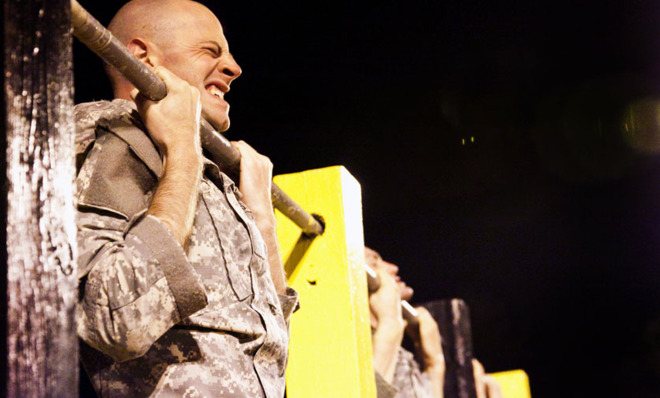Why you make best friends in the worst circumstances
Australian researchers find sharing painful experiences creates feelings of solidarity

A free daily email with the biggest news stories of the day – and the best features from TheWeek.com
You are now subscribed
Your newsletter sign-up was successful

Managers: Are you having trouble melding your employees into a cohesive group? Is getting them to trust and cooperate with one another proving to be a challenge?
Well, newly published research offers an effective, if not especially ethical, solution to your problem: Inflict some pain.
A new study from Australia suggests rituals such as arduous initiation rites serve a real purpose. It reports experiencing physical discomfort is an effective way for a group of strangers to cohere into a close-knit group.
The Week
Escape your echo chamber. Get the facts behind the news, plus analysis from multiple perspectives.

Sign up for The Week's Free Newsletters
From our morning news briefing to a weekly Good News Newsletter, get the best of The Week delivered directly to your inbox.
From our morning news briefing to a weekly Good News Newsletter, get the best of The Week delivered directly to your inbox.
"Shared pain may be an important trigger for group formation," a research team led by psychologist Brock Bastian of the University of New South Wales writes in the journal Psychological Science. "Pain, it seems, has the capacity to act as social glue, building cooperation within novel social collectives."
Bastian and his colleagues describe three experiments that provide evidence for this proposition, which was first proposed by such social theorists as Emile Durkheim. In the first, 54 university students each spent 90 seconds dipping one hand in a jug of water, ostensibly to manipulate some metal balls at the bottom.
Half of them enjoyed room-temperature water; the others endured bitterly cold ice water. Afterwards, those whose hand had just been freezing were instructed to "maintain an upright wall squat" for as long as possible, while those in the comfort group performed a far easier task, balancing on one leg for one minute (with aids if necessary).
Afterwards, all responded to a series of statements such as "I feel a sense of solidarity with the other participants" and "I feel I can trust the other participants." They rated each on a five-point scale, from "strongly agree" to "strongly disagree."
A free daily email with the biggest news stories of the day – and the best features from TheWeek.com
"Participants in the pain condition reported higher bonding," the researchers report.
A second experiment featured 62 students who followed the same protocol. Afterwards, they played an economic cooperation game in which they were instructed to choose a number between one and seven. A low number ensured a reward for the individual at the expense of the group; a high number increased personal risk, but maximized the potential benefit for the entire group.
The result: Those who had been feeling pain "opted for higher numbers than did those in the non-pain condition," Bastian and his colleagues write. A third experiment that utilized a different form of pain (eating very hot chili, as opposed to hard candy) produced the same results.
The researchers argue that pain promotes cooperation because of its "well-demonstrated capacity to capture attention and focus awareness." When you and others feel it simultaneously, they write, your fellow sufferers assume a prominent place in your mind.
"Sharing pain therefore is an especially powerful form of shared experience," the researchers write, adding that it "promotes bonding, solidarity, and, ultimately, cooperation."
So pain has its uses. But if bosses are squeamish about inflicting it, there is, fortunately, a time-tested alternative that similarly promotes cooperation: Moving together in rhythm. Which, depending upon your partner’s dance skills, can also produce pain.
Pacific Standard grapples with the nation's biggest issues by illuminating why we do what we do. For more on the science of society, sign up for its weekly email update or subscribe to its bimonthly print magazine.
More from Pacific Standard...
-
 Bad Bunny’s Super Bowl: A win for unity
Bad Bunny’s Super Bowl: A win for unityFeature The global superstar's halftime show was a celebration for everyone to enjoy
-
 Book reviews: ‘Bonfire of the Murdochs’ and ‘The Typewriter and the Guillotine’
Book reviews: ‘Bonfire of the Murdochs’ and ‘The Typewriter and the Guillotine’Feature New insights into the Murdoch family’s turmoil and a renowned journalist’s time in pre-World War II Paris
-
 Witkoff and Kushner tackle Ukraine, Iran in Geneva
Witkoff and Kushner tackle Ukraine, Iran in GenevaSpeed Read Steve Witkoff and Jared Kushner held negotiations aimed at securing a nuclear deal with Iran and an end to Russia’s war in Ukraine